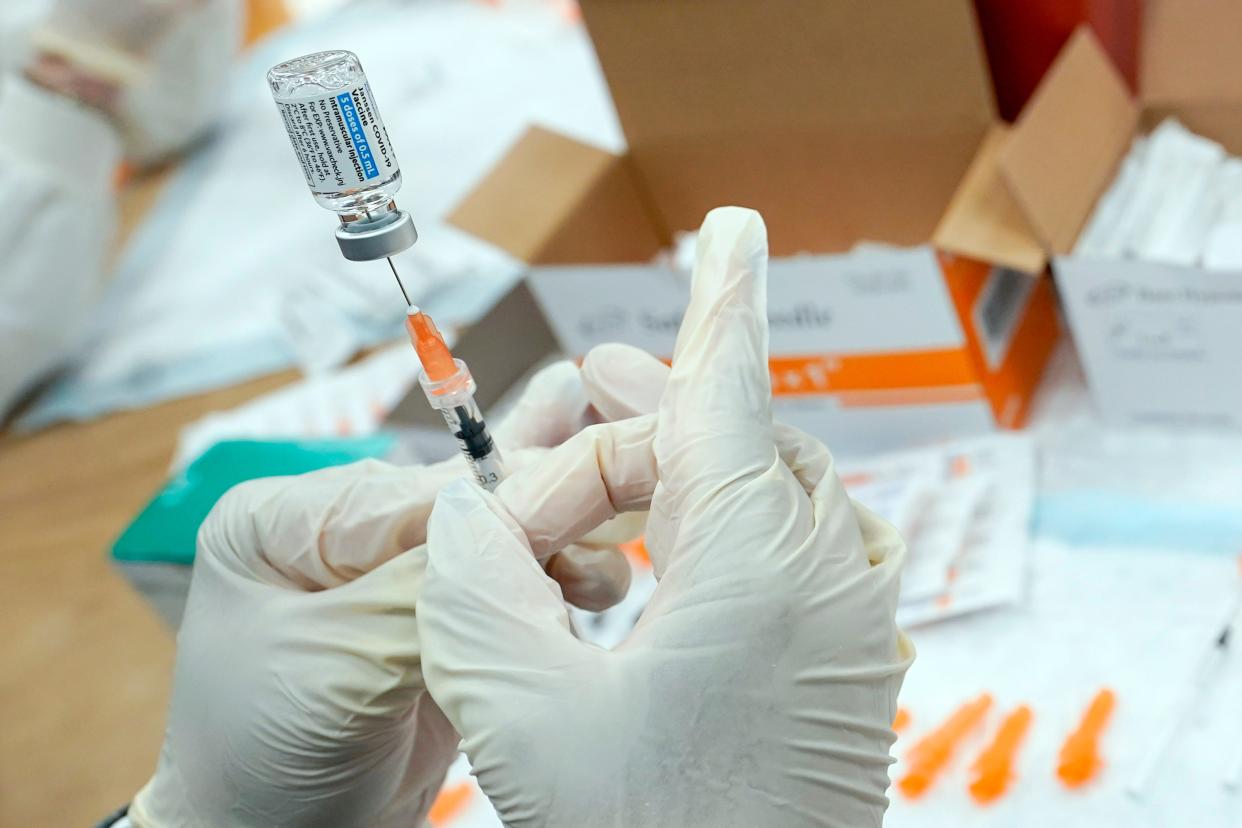No, the Supreme Court didn't declare vaccines 'unavoidably unsafe' | Fact check

- Oops!Something went wrong.Please try again later.
The claim: The Supreme Court declared vaccines to be 'unavoidably unsafe'
A July 10 Instagram post (direct link, archive link) shows a syringe being held above a baby.
"If (vaccines) are truly safe, then how is it that the Supreme Court declared them unavoidably unsafe?" reads the post.
The post was liked more than 1,100 times in two days.
Follow us on Facebook! Like our page to get updates throughout the day on our latest debunks
Our rating: False
The phrase "unavoidably unsafe" appears multiple times in a Supreme Court opinion from 2011. However, the phrase is not used to declare all vaccines "unavoidably unsafe," as the post claims. Instead, it's being used as part of a legal argument and is a reference to a specific passage in a legal publication.
Supreme Court's decision involved liability, not vaccine safety
In 2011, the Supreme Court released its decision in a case called Bruesewitz v. Wyeth, ruling a federal law does not allow vaccine manufacturers to be held liable by people seeking compensation for injuries caused by vaccine side effects.
The case in question began when, in 2005, the parents of a girl who suffered seizures and permanent brain damage after receiving a diphtheria-tetanus-pertussis vaccine sued the vaccine's manufacturer, arguing "defective design" of the vaccine caused their daughter's disabilities.
But, with a 6-2 vote, the Supreme Court sided with the manufacturer, deciding the National Childhood Vaccine Injury Act "preempts all design-defect claims against vaccine manufacturers brought by plaintiffs who seek compensation for injury or death caused by vaccine side effects," Justice Antonin Scalia wrote for the court's majority.
Nowhere in the opinion, though, does the court broadly declare all vaccines to be "unavoidably unsafe," as the post claims. Michelle Mello, a law professor at Stanford University, told USA TODAY the court's opinion in the case "did not decide whether vaccines are unavoidably unsafe or not."
"Rather, it interpreted some language in the statute that set up the Vaccine Injury Compensation Program in order to determine whether the (parents) were permitted to sue for their daughter's injury," she said.
Fact check: No, UK's health agency hasn't stopped COVID-19 vaccines in Europe
The phrase "unavoidably unsafe" does appear several times in the opinion and in the dissent. However, it's used in reference to similar language in the National Childhood Vaccine Injury Act, which says vaccine manufacturers can't be held liable for vaccine-related injuries if they were caused by "side effects that were unavoidable even though the vaccine was properly prepared and was accompanied by proper directions and warnings."
Dan Farber, a law professor at the University of California, Berkeley, said while the opinion does quote the phrase "unavoidably unsafe," it does so "only to say that it wasn't relevant."
Farber explained that the girls' parents argued lawmakers adopted the phrase from a comment, known as "comment k," that appears in an oft-cited legal publication called "Restatement of Torts, Second," which specifically discusses "unavoidably unsafe products."
Mello summarized "comment k" as saying that "some products can't be made perfectly safe but are socially important enough that courts aren't going to hold their manufacturers to the same, strict liability standard."
Farber noted that, in the opinion, Scalia writes that "unavoidable" is a common word and concludes there's no reason to believe lawmakers had "comment k" in mind while developing the National Childhood Vaccine Injury Act.
Farber also pointed out that "comment k" didn't use the phrase "unavoidably unsafe" to mean those products were inherently bad.
"On the contrary, it meant that some products like prescription drugs have side effects but are beneficial on balance," he said. "The same is true of vaccines: they all have some possible side-effects, but the good far outweighs the bad."
In their dissent, justices Sonia Sotomayor and Ruth Bader Ginsburg reference "comment k" to argue that lawmakers intended the act to exempt vaccine manufacturers from liability only if they could show in each case the vaccine was "properly manufactured and labeled, and that the side effects stemming from the vaccine's design could not have been prevented by a feasible alternative design." In other words, these references also are inconsistent with the post's claim that the high court labeled vaccines broadly unsafe.
USA TODAY reached out to the social media user who shared the post for comment but did not immediately receive a response.
Our fact-check sources:
Michelle Mello, July 13, Email exchange with USA TODAY
Dan Farber, July 13, Email exchange with USA TODAY
Casetext, Feb. 22, 2011, Bruesewitz v. Wyeth LLC
Casetext, accessed July 13, 42 U.S.C. § 300aa-22
SCOTUSblog, accessed July 13, Bruesewitz v. Wyeth
Time, Feb. 24, 2011, Bruesewitz v. Wyeth: What the Supreme Court Decision Means for Vaccines
Congress.gov, accessed July 13, H.R.5546 - National Childhood Vaccine Injury Act of 1986
Thank you for supporting our journalism. You can subscribe to our print edition, ad-free app or e-newspaperhere.
Our fact-check work is supported in part by a grant from Facebook.
This article originally appeared on USA TODAY: False claim SCOTUS called vaccines 'unavoidably unsafe' | Fact check

